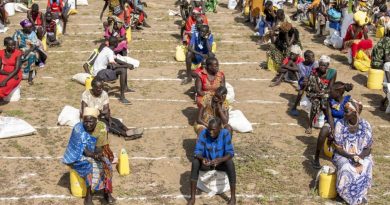FOCUS on: Ceasefire/Peacemaking Efforts in Yemen
Madeline Kruszczynski
Digital Editor
The World Bank has identified Yemen as the most impoverished Arab nation, as the country grapples with one of the most severe humanitarian crises in history. This crisis stems from a prolonged civil war that began in 2014 and has resulted in the Houthi militant group maintaining control over the region. With the recent escalation of the War in Gaza, the future of the region’s security and continued peace in Yemen hangs in uncertainty.
In 2000, President Saleh of Yemen initiated a border agreement with Saudi Arabia, aiming to disarm the Houthi group. However, this strategy only escalated tensions between the Houthis and the Yemeni government, fueling a rebellion spearheaded by the Houthi leader, Hussein Badreddin al-Houthi, as documented by The Arab Center in DC. Violence persisted intermittently until 2014, when the Houthis launched another rebellion, seizing control of Yemen’s capital, Sanaa. Despite facing international criticism, the Houthis proclaimed themselves as the leaders of the Yemeni government. The United Nations Security Council condemned this declaration, stating that the proclamation “undermine[d] the political transition process in Yemen, and jeopardize[d] the security, stability, sovereignty and unity of Yemen.”
It wasn’t until an estimated 377,000 lives were tragically lost, as documented by the Council of Foreign Relations, that discussions of a peace truce emerged. In December 2023, Hans Grundberg, the United Nations Special Envoy for Yemen, heralded a breakthrough in peace talks that the United Nations relayed as “a significant step… towards a future that fulfills the legitimate aspirations of all Yemenis.” These negotiations called for the reset of vital aspects of life and economy, such as resuming the payment of public sector salaries, the resumption of oil exports, the facilitation of internal transportation routes, and the lifting of restrictions on land and seaports in the region.
Through collaborative efforts with the UN and neighboring nations, the prospect of peace within Yemen seemed within reach. However, amidst the devastating Israel-Hamas war, the Houthis have initiated military actions to control the Red Sea, launching missiles and attacking boats they claim have connections to Israel, according to Reuters. The Houthis justify these attacks as support for both the Yemeni and Palestinian populations. In a released statement, a leader of the group attributed responsibility for the aggression against Yemen to the United States and Britain, asserting the Yemeni armed forces’ readiness to defend the nation’s sovereignty and independence.
Despite the Houthis’ claims that they act in the interest of their people, experts highlight significant flaws in their argument. The Houthis, now functioning as a de facto government, engage in tax collection and currency printing but struggle to provide basic services such as food and clothing to the Yemeni population, as reported by Vox. These governance deficiencies manifest in the poor quality of life, with nearly half of the population lacking access to drinking water, as estimated by Human Rights Watch. The Council on Foreign Relations adds that an estimated 60 percent of the conflict’s deaths between 2015 and 2022 were a result of a lack of food and medical care. In light of these realities, the conflict in Gaza presents the Houthis with an opportunity to sway the population’s opinion through their expertise in military rebellion.
The escalation of rebellion along the Red Sea is significantly undermining the prospects for peace in the region. This is further exacerbated by a surge in young Houthi fighter recruits, with reported numbers reaching tens of thousands, according to Al Jazeera. As military activities intensify within Yemen and attacks on the Red Sea provoke aggression from Western powers, including reported strikes on Houthi targets by the US and Britain, as noted by , the situation only points towards a further escalation of violence. Such actions risk pushing the region even further away from achieving a state of non-violence.
Image courtesy of Getty Images


